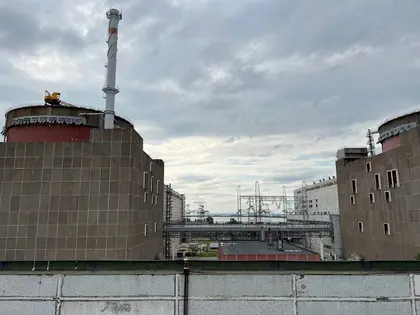The occupied Zaporizhzhia nuclear plant has been reconnected to Ukraine's electricity grid again after being offline for several hours, officials in Kyiv said on Monday.
Earlier Monday Ukraine's nuclear agency Energoatom had accused Russia of carrying out attacks that caused a power cut. It said it was the seventh time the plant entered "blackout mode" since Moscow's troops took control in March 2022.
JOIN US ON TELEGRAM
Follow our coverage of the war on the @Kyivpost_official.
"The station is switching to power from the Ukrainian energy system," Ukrenergo, Ukraine's state grid operator, said in a statement later Monday.
"Despite the enemy's morning attack, Ukraine's energy system is operating in a stable fashion," Ukrenergo said, adding that there was enough electricity to "cover the needs of consumers."
Located in the southeastern region of Zaporizhzhia, the six-reactor plant is the largest in Europe. The grid operator said that in the eastern region of Dnipro, high-voltage lines had been damaged as a result of Moscow's latest strikes.
The Dnipro governor said an overnight aerial attack had been reported, with four Russian missiles and 15 drones downed and at least eight civilians injured.
The last power cut at Zaporizhzhia had been caused by another wave of Russian missile attacks, Energoatom said.
The UN's nuclear chief Rafael Grossi, who has tried to negotiate with both sides to reach a deal on the safety of the plant, said it was the seventh power cut at the huge nuclear facility during the war.

The Wishful Diplomacy of Mad Medvedev – When Progress Isn’t
"Nuclear safety situation at the plant extremely vulnerable," he said on Twitter. "We must agree to protect plant now; this situation cannot continue." Grossi visited the Moscow-occupied plant in March.
Zaporizhzhia used to supply around 20 percent of Ukraine's electricity and continued to function in the early months of Russia's offensive despite frequent shelling, before halting power production in September.
None of its six Soviet-era reactors has since generated electricity, but the facility remains connected to the Ukrainian power grid for its own needs, notably to cool the reactors.
You can also highlight the text and press Ctrl + Enter










